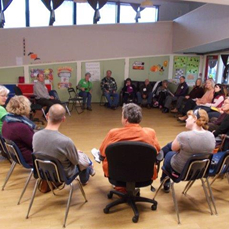Back to November 2014 Newsletter
30th Anniversary Meeting in Victoria

It was a typically damp Sunday in Canada's "City of Gardens", when more than 60 Seeds of Diversity members met in Victoria to celebrate our 30th anniversary.
Seeds of Diversity got its start in 1984 when a group of gardeners became concerned that their favourite seed varieties were gradually disappearing from seed catalogues. They organized a conference, not knowing if anyone else would care. When that first meeting turned out to be a vibrant, inspiring gathering of budding seed savers, they formed a commitee called the Heritage Seed Program under the wing of the Canadian Organic Growers.
By 1995, that group had grown into a membership of its own, and it incorporated as Seeds of Diversity Canada.
We even had four of those original members at our 30 year celebration!
What has changed in thirty years?
 Seed biodiversity is a mainstream concern. Thirty years ago most people had never heard of seed banks, and hardly anyone talked about crop genetic security. Even the word "biodiversity" was hardly known yet. Now, people read about seed banks in their morning paper, and they know what we're talking about when we discuss endangered food plants.
Seed biodiversity is a mainstream concern. Thirty years ago most people had never heard of seed banks, and hardly anyone talked about crop genetic security. Even the word "biodiversity" was hardly known yet. Now, people read about seed banks in their morning paper, and they know what we're talking about when we discuss endangered food plants.
Seed libraries are popping up everywhere, seed-saving workshops are more popular than ever, and the local food movement is rapidly developing a sister local seed movement.
What's the same?
Sadly, our original concerns are still with us. Despite tremendously greater interest in seed saving, Canada's important seed varieties are still disappearing.
At a roundtable discussion with B.C. seed companies, we discussed the rapid turnover in the small-scale seed business. According to our 2014 Canadian Seed Catalogue Index, 36 new seed companies began selling seeds during the past two years, and 18 companies shut down. During the same period, 782 seed varieties disappeared from Canadian seed catalogues (that's about 11%). There is huge turbulence in the seed business, and small companies have to work hard to make ends meet. The result: Seeds of Diversity's members still have an important role to play saving rare varieties!
And the constant for thirty years has always been sharing seeds, and learning how to save them. Members were lucky to have Michelle Smith on hand to teach her East-coast brand of seed saving (which works on the west coast too), and the seed swap table was busy all day long.
Linda Gilkeson, our feature speaker and author of several books on west coast gardening, gave an extraordinary talk on four-season harvest. Although not all of us can garden in Victoria's gentle growing conditions, Linda had fantastic tips that everyone can use for extending the vegetable harvest into the colder parts of the year. Some of her strongest allies are hardy varieties that withstand cold and frost, and those that tolerate shorter daylengths.
Again, talk turned to the loss of key vegetable varieties. Linda uses a strategy of growing different cauliflowers at different times of year. She plants "winter cauliflower" in late summer, protecting it through the cold months so that it develops its heads in the spring. Currently, "Galleon" and "Purple Cape" are the only two varieties that work well in this system, but Linda told us that twenty years ago there were over twenty winter cauliflower varieties available locally. Since few people attempt four-season gardening, there is not a large scale market for such varieties, but their disappearance prevents us all from attempting this potentially important local-food strategy. What have we truly lost in those twenty years?
Linda is looking for more robust open-pollinated cultivars, screening greens for frost tolerance, and searching for the old stand-bys that gardeners once used for four-season self-sufficiency. We all should be doing that.
Thank you to all the volunteers who organized our 30th Anniversary meeting, and a special thank you to all our members who've made Seeds of Diversity thrive for three decades.
Not yet a member?
An annual membership to Seeds of Diversity gives you access to our seed exchange, seed grow-out programs, and our online news.

We depend on donations to do our work.

Thank you for your support!
